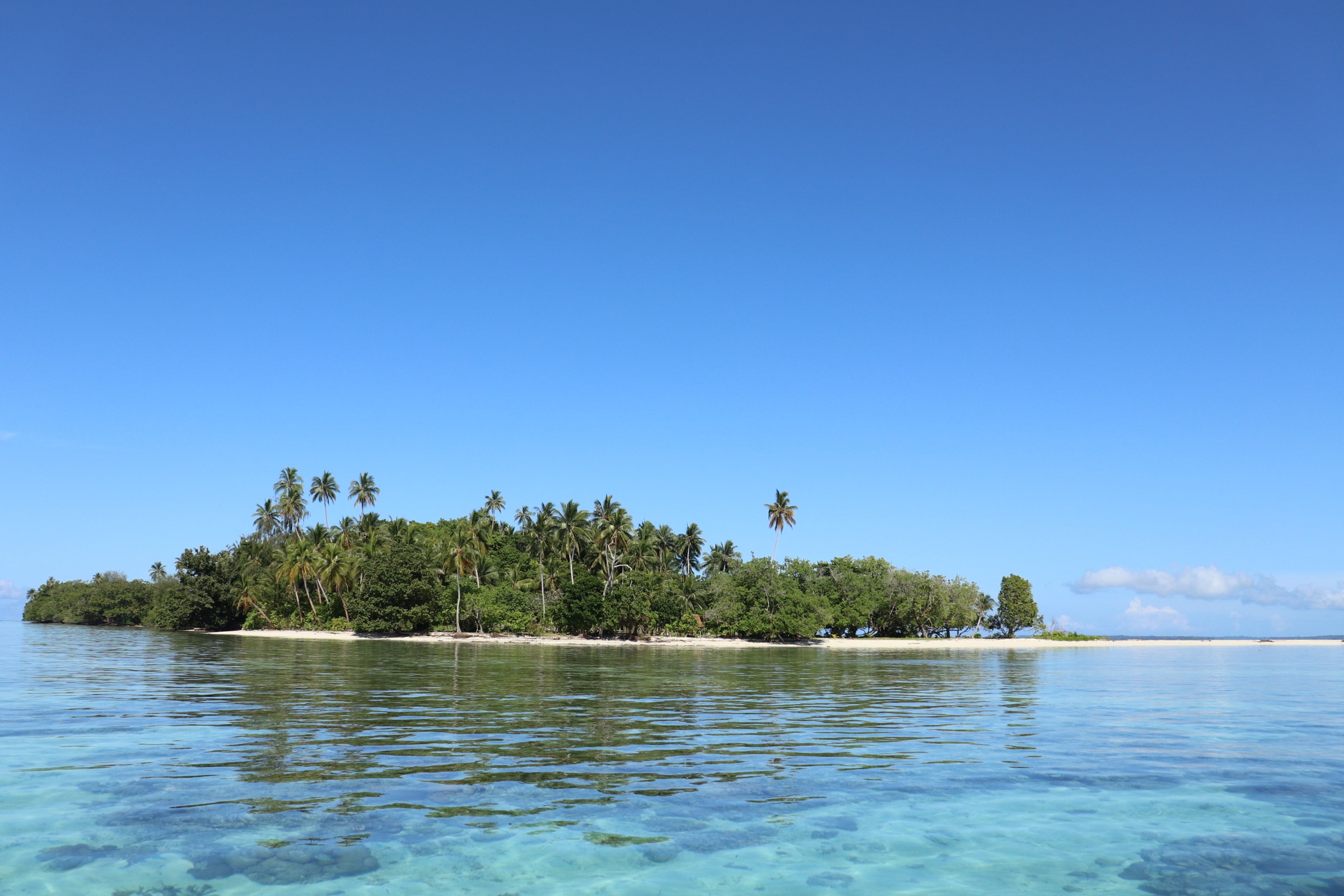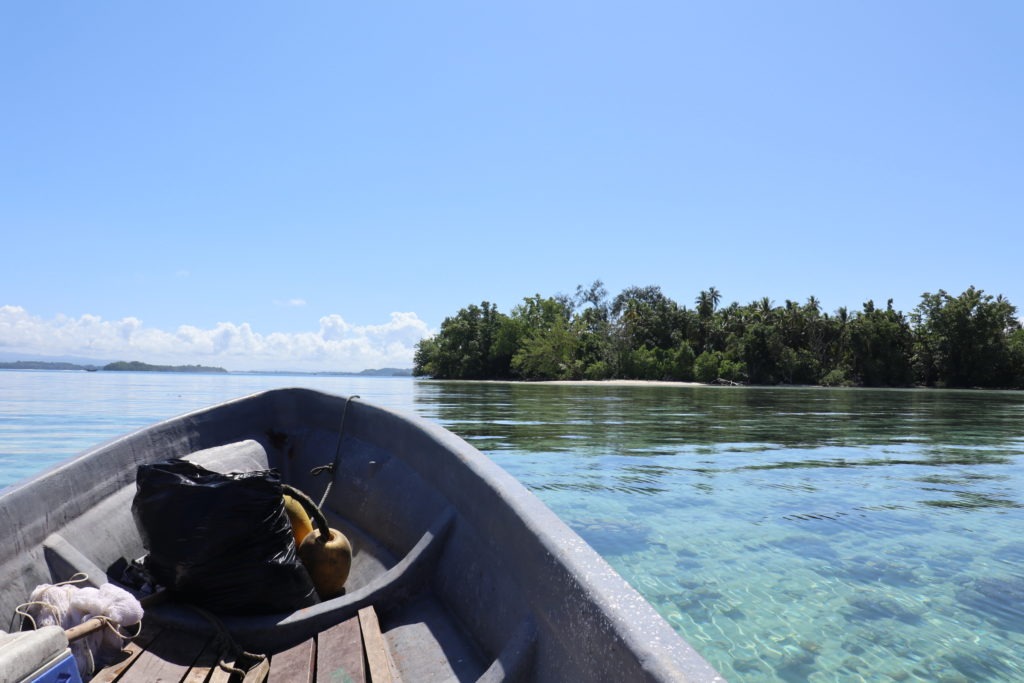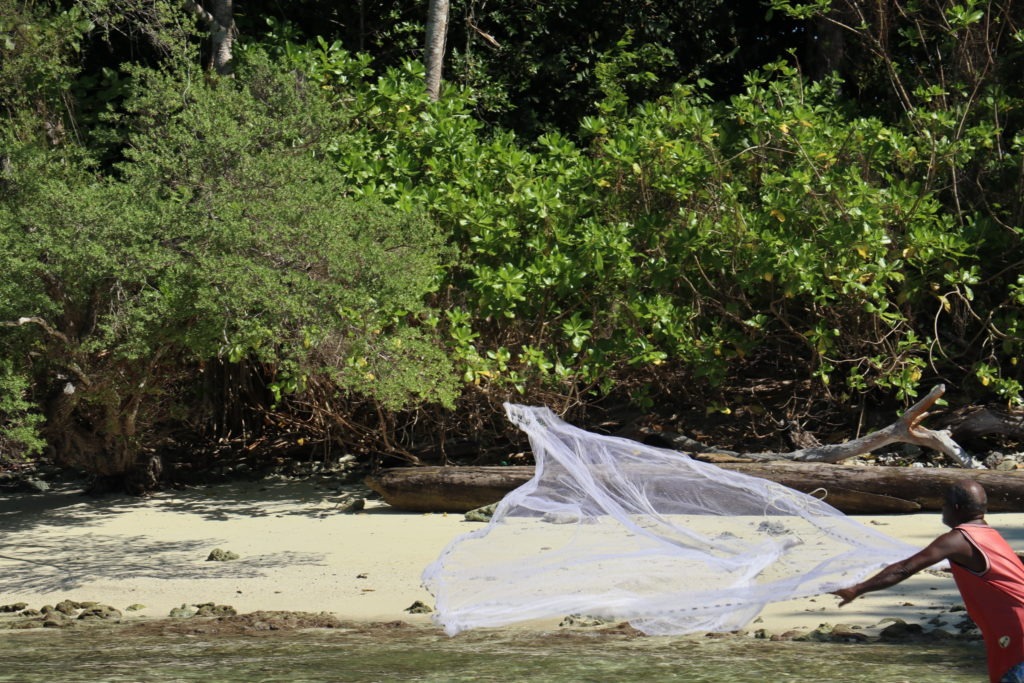Solomon Islands
From Strength to Strength Speedos and speedboats
Danielle Norton goes to Solomon Islands to attend the Lagoon Festival, a week-long celebration of the culture, customs and pastimes of people in this region.
February 7, 2020
Pacific Island Living
February 7, 2020The sound of a conch shell echoes across the sparkling blue lagoon and the 10th annual Roviana festival begins. Three tomokos propel rapidly through the water toward the wharf where the waiting crowd has gathered. The war canoes are removed from their sacred resting place, launched in the water only once a year. The crew has dressed for the occasion. Their faces, arms and torsos are striped with white war paint and their heads are adorned with wreaths of coconut leaves. As the tomokos glide into shore, the grunting and shouting of the men is a reminder this is a serious business; these are warships, not toys and their oarsmen are warriors, not boys.
People come from far and wide to celebrate the annual Roviana Lagoon Festival at the repurposed marketplace in Munda in the Western Province of Solomon Islands, at the water’s edge. Dignitaries fly in from the nation’s capital and villagers arrive by sea from every village on the lagoon; in speedboats, banana boats and dugout canoes. The festival is a week-long celebration of the culture, customs and pastimes of people in this region.

I’ve been invited here to meet the Roviana people and observe as they celebrate with traditional dancing, sporting events and an important speech competition. Over the next four days I will watch as kids come to town to learn from their elders; how to make a canoe, how to carve the paddles, how to weave with coconut leaves.
A major initiative of the festival is the inaugural speech competition. Young people from lower primary to upper secondary level have prepared speeches on the festival’s theme: the importance of reviving and preserving Roviana culture. Youth speak about their ancestral history, about learning from their elders and being careful not to be drawn too much into western lifestyles. One little girl speaks about processed food and how villagers should revert to fishing and eating from their gardens in an effort to maintain good health. Another reminds the crowd about the natural remedies for specific ailments. Every speech further reinforces the Roviana people value their culture enormously. One speaker declares that:
“Our culture is the voice of our ancestors, guiding us through our life from birth to death. Do not let their voices fade away. We must learn from our Roviana elders, before we lose that knowledge forever.”
Between speeches, groups of teenage girls perform dances, their routines perfected after weeks of practice, flipping their hands and swaying their hips to the rhythm of much more modern music than their mothers would have danced to in the villages. Even the confident girls display a shyness as they look out at the large crowd, the members of their community, who have gathered to hear the speeches and be entertained en masse.
Seeing the youth of the community dancing makes my heart sing. In the sharp movements of the boys I can envisage their warrior ancestors and the warriors they too may become, if the need arises. When the girls move their hips and flick their wrists gracefully, I see the mothers they will be, the laughter and love in their hearts, I see them cooking by their fires and bending and swaying as they harvest in their gardens. All of it is there in the dance, even though these kids are doing a very modern interpretation of dancing. There’s no string band, no brother, uncle or father beating the drum, it’s modern music blaring from speakers, but the ancient stories and the Roviana culture runs through these young people and is kept alive for another generation.
At the edge of the Agnes Gateway Hotel in Munda, a boy in traditional warrior dress runs past me waving his spear, his big smile and cheeky “hello” juxtaposing with his fierce costume and weapon. He is about to perform on stage with a dozen of his friends. He pauses to pose for me, a huge grin spreading across his face before he stops and assumes his warrior stance. Proudly, this boy represents his ancestral tribe which values strength and honours the bravery of its fighters.
Sporting prowess is celebrated here in the Roviana region and all members of the community have an opportunity to compete and display their strengths in the canoe races, swimming races and the ironman contest. There is even an underwater breath holding competition.
“Some of the kids are very good at holding their breath,” a woman tells me, proudly, her smile wide.
The crowd on the jetty swells as the canoe races begin. All are keen to watch and encourage their friends and relatives in their endeavours. The contestants float at the start line, paddles at the ready, waiting for the starter to give them permission to go. “Get set, Ready, Go!” he calls. They dip their oars in the water and launch, sometimes colliding with each other, sometimes sinking or capsizing. Each mishap brings a great cackle of delight from the whole crowd and causes others to come running to see what is going on.
People hoot with laughter when a kid emerges from the water in Speedos. People run over to see the spectacle and point at him. The Solomon Islanders are a modest people and most swim fully clothed but this boy wears his costume and his win, with pride. He was the only boy in the race to be different and his people celebrate his motivation.
“I like him,” says Jonathan Taisia, who works for the ministry of culture and tourism. “He’s thinking smart, like he’s in a competition.”
As well as being entertaining, there is a teaching and learning element to the festival. The canoe carving contest draws great crowds of boys mainly, all gathering to watch a relay of men hacking away at a log with their tiny axes, shaving and shaping the vessel, tapping it with the wooden handle every so often to hear the echo and judge their next stroke until it has been chipped into a functional canoe. Elsewhere in the marketplace, three men spend two days building a traditional Solomon village house. Kids watch on, learning quietly, as the men pause during the heat of the day and rest under the half thatched roof.

Moment by moment, the culture, the Roviana way of life, is being modelled and passed on from one generation to the next.
As I sit at the water’s edge and watch the glorious sky change from bright blue to orange then pink, I reflect on how lucky the Roviana people are. The strength of this community is the mutual love and respect for each other and their rich heritage .The Roviana Lagoon Festival occurs every year in October.
© 2024 Pacific Island Living Magazine all Rights Reserved
Website by Power Marketing